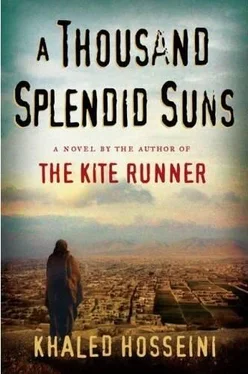For Mammy, this was the day she had longed for. This brought to fruition all those years of waiting.
At last, she could end her vigils, and her sons could rest in peace.
THE DAY AFTER Najibullah surrendered, Mammy rose from bed a new woman. For the first time in the five years since Ahmad and Noor had become shaheed, she didn't wear black. She put on a cobalt blue linen dress with white polka dots. She washed the windows, swept the floor, aired the house, took a long bath. Her voice was shrill with merriment.
"A party is in order," she declared. She sent Laila to invite neighbors. "Tell them we're having a big lunch tomorrow!"
In the kitchen, Mammy stood looking around, hands on her hips, and said, with friendly reproach, "What have you done to my kitchen, Laila? Wooy. Everything is in a different place."
She began moving pots and pans around, theatrically, as though she were laying claim to them anew, restaking her territory, now that she was back. Laila stayed out of her way. It was best. Mammy could be as indomitable in her fits of euphoria as in her attacks of rage. With unsettling energy, Mammy set about cooking: aush soup with kidney beans and dried dill, kofta, steaming hot mantu drenched with fresh yogurt and topped with mint.
"You're plucking your eyebrows," Mammy said, as she was opening a large burlap sack of rice by the kitchen counter.
"Only a little."
Mammy poured rice from the sack into a large black pot of water. She rolled up her sleeves and began stirring.
"How is Tariq?"
"His father's been ill," Laila said "How old is he now anyway?"
"I don't know. Sixties, I guess."
"I meant Tariq."
"Oh. Sixteen."
"He's a nice boy. Don't you think?"
Laila shrugged.
"Not really a boy anymore, though, is he? Sixteen. Almost a man. Don't you think?"
"What are you getting at, Mammy?"
"Nothing," Mammy said, smiling innocently. "Nothing. It's just that you… Ah, nothing. I'd better not say anyway."
"I see you want to," Laila said, irritated by this circuitous, playful accusation.
"Well." Mammy folded her hands on the rim of the pot. Laila spotted an unnatural, almost rehearsed, quality to the way she said "Well" and to this folding of hands. She feared a speech was coming.
"It was one thing when you were little kids running around. No harm in that. It was charming. But now. Now. I notice you're wearing a bra, Laila."
Laila was caught off guard.
"And you could have told me, by the way, about the bra. I didn't know. I'm disappointed you didn't tell me." Sensing her advantage, Mammy pressed on.
"Anyway, this isn't about me or the bra. It's about you and Tariq. He's a boy, you see, and, as such, what does he care about reputation? But you? The reputation of a girl, especially one as pretty as you, is a delicate thing, Laila. Like a mynah bird in your hands. Slacken your grip and away it flies."
"And what about all your wall climbing, the sneaking around with Babi in the orchards?" Laila said, pleased with her quick recovery.
"We were cousins. And we married. Has this boy asked for your hand?"
"He's a friend. A rafiq. It's not like that between us," Laila said, sounding defensive, and not very convincing. "He's like a brother to me," she added, misguidedly. And she knew, even before a cloud passed over Mammy's face and her features darkened, that she'd made a mistake.
"That he is not," Mammy said flatly. "You will not liken that one-legged carpenter's boy to your brothers. There is no one like your brothers."
"I didn't say he… That's not how I meant it."
Mammy sighed through the nose and clenched her teeth.
"Anyway," she resumed, but without the coy lightheadedness of a few moments ago, "what I'm trying to say is that if you're not careful, people will talk."
Laila opened her mouth to say something. It wasn't that Mammy didn't have a point. Laila knew that the days of innocent, unhindered frolicking in the streets with Tariq had passed. For some time now, Laila had begun to sense a new strangeness when the two of them were out in public. An awareness of being looked at, scrutinized, whispered about, that Laila had never felt before. And wouldn't have felt even now but for one fundamental fact: She had fallen for Tariq. Hopelessly and desperately. When he was near, she couldn't help but be consumed with the most scandalous thoughts, of his lean, bare body entangled with hers. Lying in bed at night, she pictured him kissing her belly, wondered at the softness of his lips, at the feel of his hands on her neck, her chest, her back, and lower still. When she thought of him this way, she was overtaken with guilt, but also with a peculiar, warm sensation that spread upward from her belly until it felt as if her face were glowing pink.
No. Mammy had a point. More than she knew, in fact. Laila suspected that some, if not most, of the neighbors were already gossiping about her and Tariq. Laila had noticed the sly grins, was aware of the whispers in the neighborhood that the two of them were a couple. The other day, for instance, she and Tariq were walking up the street together when they'd passed Rasheed, the shoemaker, with his burqa-clad wife, Mariam, in tow. As he'd passed by them, Rasheed had playfully said, "If it isn't Laili and Majnoon," referring to the star-crossed lovers of Nezami's popular twelfth-century romantic poem – a Farsi version of Romeo and Juliet, Babi said, though he added that Nezami had written his tale of ill-fated lovers four centuries before Shakespeare.
Mammy had a point.
What rankled Laila was that Mammy hadn't earned the right to make it. It would have been one thing if Babi had raised this issue. But Mammy? All those years of aloofness, of cooping herself up and not caring where Laila went and whom she saw and what she thought… It was unfair. Laila felt like she was no better than these pots and pans, something that could go neglected, then laid claim to, at will, whenever the mood struck.
But this was a big day, an important day, for all of them. It would be petty to spoil it over this. In the spirit of things, Laila let it pass.
"I get your point," she said.
"Good!" Mammy said. "That's resolved, then. Now, where is Hakim? Where, oh where, is that sweet little husband of mine?"
IT WAS A dazzling, cloudless day, perfect for a party. The men sat on rickety folding chairs in the yard. They drank tea and smoked and talked in loud bantering voices about the Mujahideen's plan. From Babi, Laila had learned the outline of it: Afghanistan was now called the Islamic State of Afghanistan. An Islamic Jihad Council, formed in Peshawar by several of the Mujahideen factions, would oversee things for two months, led by Sibghatullah Mojadidi. This would be followed then by a leadership council led by Rabbani, who would take over for four months. During those six months, a loya jirga would be held, a grand council of leaders and elders, who would form an interim government to hold power for two years, leading up to democratic elections.
One of the men was fanning skewers of lamb sizzling over a makeshift grill Babi and Tariq's father were playing a game of chess in the shade of the old pear tree. Their faces were scrunched up in concentration. Tariq was sitting at the board too, in turns watching the match, then listening in on the political chat at the adjacent table.
The women gathered in the living room, the hallway, and the kitchen. They chatted as they hoisted their babies and expertly dodged, with minute shifts of their hips, the children tearing after each other around the house. An Ustad Sarahang ghazal blared from a cassette player.
Laila was in the kitchen, making carafes of dogh with Giti. Giti was no longer as shy, or as serious, as before. For several months now, the perpetual severe scowl had cleared from her brow. She laughed openly these days, more frequently, and – it struck Laila – a bit flirtatiously. She had done away with the drab ponytails, let her hair grow, and streaked it with red highlights. Laila learned eventually that the impetus for this transformation was an eighteen-year-old boy whose attention Giti had caught. His name was Sabir, and he was a goalkeeper on Giti's older brother's soccer team.
Читать дальше












